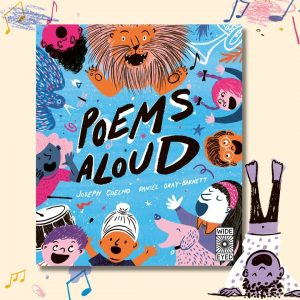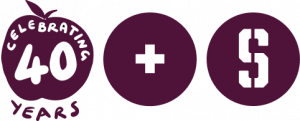Joseph Coelho has been a long-time friend of Apples and Snakes. With his latest release, Poems Aloud, what better way to celebrate it than on World Book Day. It’s full of beautiful illustrations and stand-up and read out loud poetry for children (or anyone really!). 3 March also marks the start of SPINE Festival, a free literature festival for children and their families across 16 boroughs in London. Let’s get between the pages and into the mind of Joseph…
When you started working with Apples and Snakes about 20 years ago, you did a lot of work as one of our poet educators as well as making performance work for children and young people – how did this grounding in performing poetry for children help you develop your written work for these audiences? How do you use this within your written work?
There is nothing quite like standing in a school hall or classroom or a theatre space being stared at by a tonne of eager young faces wanting to be entertained. It’s terrifying and exhilarating. It’s also a wonderful space to hone your craft. In those early days I had plenty of poems and exercises that did not work, I failed a great number of times. Sometimes I would start a poetry writing session with a plan and then half-way through I would realise that I had exhausted all of my ideas – the kids had worked far more quickly than expected or perhaps weren’t as engaged as I hoped. I’d find myself inventing an activity on the spot. Some of those “on-the-fly” activities I still use today, they worked and were honed through repetition as I realised what kept the kids engaged and what didn’t.
Those early days as a poet educator for Apples and Snakes became a theatre of evolution. I had help of course. Through Apple and Snakes I had the pleasure of shadowing Francesca Beard at The British Library and seeing other greats like Malika Booker and Jacob Sam-La Rose work their magic learning and growing as I went along. Those lessons have informed and inspired a great deal of what I do now, teaching me what young audiences are hungry for, what displeases them, what thrills them and what gets them hooked.
What made you want to write Poems Aloud?
Poetry comes to life in that shared space between stalls and stage, there is something primal in hearing a voice lifting up to the heavens to share carefully curated words.
Through Poems Aloud I hope to encourage more young people to lift up their voices and to feel first-hand the benefits that lie therein: the increases in confidence, the welding of bravery and the solidifying of joy.
Poems Aloud is all about fun and getting stuck in. What’s the funniest moment you’ve had working with poetry and children?
I think it’s rare to have a day in a school where there isn’t a moment of joyous laughter- comes with the territory. I often run an exercise where I get the whole class to walk around the room reading their poems aloud all at the same time, as you can imagine the classroom becomes a cacophony of sound. I then shout “FREEZE” and then challenge them to continue reading but this time using a happy voice, they continue reading and now the sound is loud but very happy until I shout “FREEZE” again and suggest: an angry voice/a chilled voice/a robot voice/a witch’s voice!/ a silly voice. Each iteration often leads to students rolling on the floor laughing at their own voices and the strange sounds issuing from their classmates’ lips.
Your book is beautifully illustrated by Daniel Gray-Barnett, how do the illustrations compliment your work?
 Daniel’s illustrations really do leap off the page. They are poems in themselves and I think his use of colour is amazing. The vibrancy of his images makes you want to lift the poems up and shout them out. But he also is able to show great tenderness and sensitivity through his work.
Daniel’s illustrations really do leap off the page. They are poems in themselves and I think his use of colour is amazing. The vibrancy of his images makes you want to lift the poems up and shout them out. But he also is able to show great tenderness and sensitivity through his work.
I’m thinking here of his spread for the poem This Bear, a poem about a bear being released into the wild after a lifetime of captivity. Daniel’s spread shows the bear from behind gazing up into a beautiful pink sky and it’s like you can hear the bear’s sigh of relief to be free.
How did you take the initial ideas of Poems Aloud into print and how long did this take? Did you start off with a single poem and were asked to write more by the publisher?
The book took the best part of a year to put together. I began by thinking about the different performance techniques I wanted to share and then writing poems that would best highlight those techniques. For instance, I knew I wanted to write a poem that would be read quietly and get progressively louder. With that concept in mind, I started to think about subjects that would suit the performance and that’s how I came up with the notion of a poem about a radio being turned up when a favourite song plays.
What are your top 3 tips to encourage children to enjoy reading and writing poetry?
Value their voice and their experience. Let them know that the things they are interested in, whatever that may be, is ripe material for a poem be it computer games, unicorns or Pokémon! And that their opinions and their take on things can also make great poems. Maybe they want to write a poem about their favourite football team, or why they think they should be able to eat cake for dinner or why adults should do more about climate change!
Give them a notebook, a beautiful notebook and a fun pen. I love stationary and there is pleasure in using different coloured pens and pencils, I have used novelty pens that look like skeletons that box! Pens that vibrate, pens that are glittery, pens that light up and flash.
The act of putting pen to paper should be a fun experience and very little is more fun than writing in a beautiful book with a brilliant pen.
Allow opportunities for new experiences, invite them to make notes whilst visiting a gallery or a museum or a theme park or the local park or simply a walk around their local streets. Take them on a local adventure exploring local streets you’ve never been down before. It’s amazing how different your local environment can look from a new perspective and this of course can fire up the imagination. What lurks behind the library? Where does that alley lead? Where might that footpath take you?
For any aspiring writers of children’s poetry what’s the one thing you wish you knew when you started writing for kids?
That there is a need for more published children’s poetry. If I had realised that I would have gone knocking on the door of publishers much earlier. That said, when I started out there was a belief that poetry doesn’t sell, which of course is nonsense. Like anything, books that are well marketed and promoted and believed in and, of course, are good, will always sell and a lot of that can be done on the enthusiasm and passion of the poet. Are you willing to read your poems at the local library or bookshop? Do you have ideas for writing activities based around your poems? Have you shared your poems at any poetry events? All of these things are something to think about.
Obviously apart from you – who are your top three poets writing and performing for kids?
Oh gosh that’s too hard so I’m going to say six!
I love hearing John Agard perform he has such a commanding prescence.
John Hegley always surprises with his words of fancy and delight.
Valerie Bloom always makes me stop and think with words that paint pictures.
Matt Goodfellow’s poems and performance style has beautiful heart and honesty.
Julia Donaldson is a complete delight to watch her stories are simultaneously songs and poems.
Ruth Awola’s poetry is beautiful and powerful and sweet and sincere.
What’s next for Joseph Coelho?
A great deal of writing, I have some exciting projects coming up which I can’t wait to share across the age ranges with a new Luna book with Illustrator Fiona Lumbers, another Fairy Tales Gone Bad story with illustrator Freya Hartas and of course more poetry including another collection with illustrator Daniel Gray-Barnett called Smile Out Loud, filled with happy poems.
Joseph Coelho is an award-winning children’s author, performance poet and playwright based in London. His debut poetry collection, Werewolf Club Rules, was the 2015 winner of the CLPE CLiPPA Poetry Award. His second book, Overheard in a Tower Block, was shortlisted for the 2018 CLPE CLiPPA Poetry Award and is longlisted for the 2019 UKLA Book Awards. Joseph features in the BBC Teach ‘Understanding Poetry’ online series.
His work has poetry and performance at its heart, drawing on over 16 years’ experience running dynamic creative literacy sessions in schools. He aims to inspire young people through stories and characters they can recognise.
His most recent work, Poems Aloud, is now available from your usual book stores and retailers.
Follow Joseph: Website | Twitter | Instagram
Image credit: The Bear – taken from Poems Aloud, illustrated by Daniel Gray-Barnett

